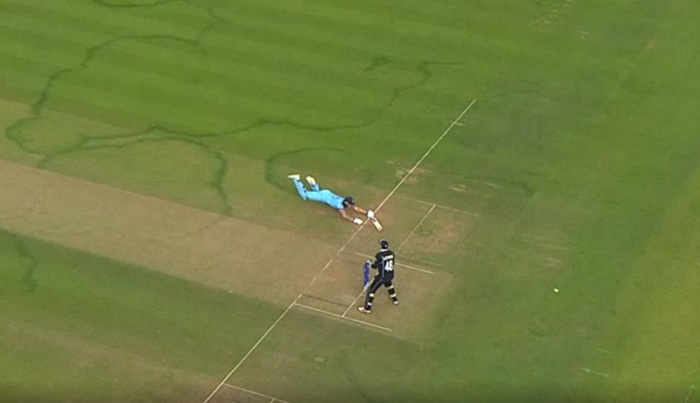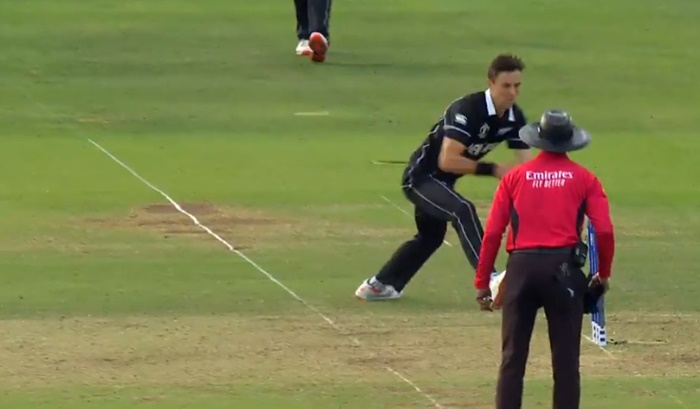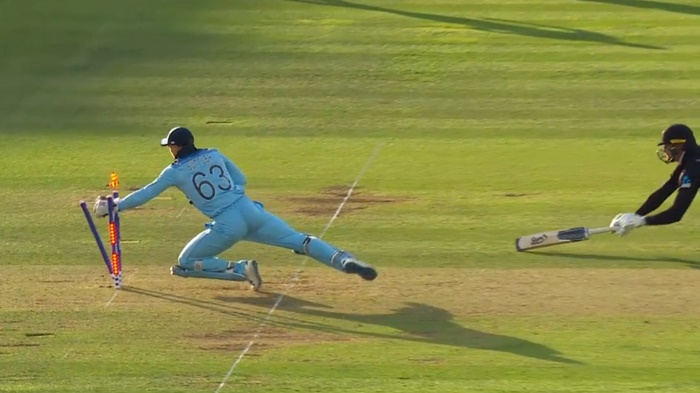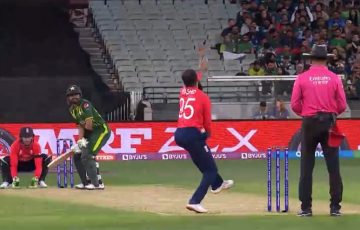2019 Cricket World Cup final, England v New Zealand
Cricket is at its very purest and best when it’s completely village; when the bowlers are batting and people are being run-out and everyone has to keep checking the laws and playing regulations because they don’t have the faintest idea what’s going.
Cricket chaos is the greatest chaos. Cricket chaos is the greatest thing of all.
Here are five bonkers moments from the climax of the World Cup final. Let’s try and work out which was the cricketiest one.
The Trent Boult boundary non-catch

Recap: With 22 runs needed to win off the last nine balls, Ben Stokes hit the ball high and hard. Not so hard that the ball flew into the stands though. It dropped within reach of Trent Boult on the boundary who caught it.
Why it was very cricket: A clean, fair catch and the game was basically New Zealand’s, but six runs would mean England still had a chance. Trent Boult trod on the foam toblerone that represents the boundary. He did it while holding the ball, so it was a six. It was not entirely clear that the ball itself at any point actually crossed the boundary, but that doesn’t matter.
How uniquely cricket was this moment? It was pretty damn cricket.
The deflected overthrow for four/six

Recap: England needed nine runs to win the World Cup off three balls. Ben Stokes hit the ball, ran two, and dived for his ground. As he was doing this, he hit a second shot and it went for four. Here’s why it was the greatest shot anyone has ever hit.
Why it was very cricket: Overthrows – scoring surprise extra runs when the fielding side can’t get the ball where it needs to be at the first time of asking – is tremendously cricket. This particular instance was unusually fine because the ball deflected off Stokes. Standard practice is not to run in these situations because it feels a bit mean. And England didn’t run. They stood there and watched the ball go over the ropes for four (additional) runs. You don’t have to claim overthrows; they’re added automatically, so that delivery went down as a six and there was nothing anyone could do about it. As a final flourish, people are still arguing about whether it should have been a five because of the ambiguity of the wording of the game’s laws. Does ‘the act’ of an overthrow take place when the ball is thrown or when it fails to be safely gathered? There was a one run difference depending on how you answer that question.
How uniquely cricket was this moment? It was quite insanely cricket really.
The Adil Rashid run-out

Recap: England needed three to win off two balls. Ben Stokes pocked a yorker into the outfield while falling over and he and Adil Rashid tried to run a near-impossible two. Rashid didn’t even get close to making it and was run-out.
Why it was very cricket: Firstly, Rashid was out without even facing a ball. Secondly, it didn’t matter. Thirdly, it did matter. Being out without even doing the thing you’re there to do is very cricket. It didn’t matter because the losing of a wicket was of much less importance than engineering a situation where Ben Stokes would face the next ball. It did matter because running Rashid out negated the second run. The run was more important than the wicket.
How uniquely cricket was this moment? It was pretty damn cricket.
The Mark Wood run-out

Recap: England needed two to win off the final ball. Ben Stokes planted his bat in the way of a full toss and then he just started running. He and Mark Wood completed the first run in zero seconds, but this still didn’t give them enough to time to complete the second and Wood was run out.
Why it was very cricket: As with Rashid, Wood was out without facing a ball. Running him out also prevented what would have been the match-winning run. Again, the run was more important than the wicket – a complete inversion of normal priorities that only really applies for a few deliveries a match. The dismissal meant the game was tied – both teams had the same number of runs. It used to be that the team that lost fewest wickets (New Zealand) would be declared the winner in these situations, but they don’t do that any more because a Super Over is of course so much more satisfactory…
How uniquely cricket was the moment? About as cricket as the Rashid one, but with the added nuance that this decided the match. Or rather didn’t.
The Martin Guptill run-out

Recap: New Zealand needed two to win off the final ball of the Super Over. Martin Guptill and Jimmy Neesham ran an easy one but England got the ball to Jos Buttler in time to prevent the second.
Why it was very cricket: All of the reasons that applied to the Rashid and Wood run-outs, but with the added bonus that even though the Super Over scores were level, England won because they’d hit more fours during their main innings. Nobody knew (or cared) about this random ‘it’ll never be needed anyway’ rule until after England’s Super Over when it became apparent what New Zealand’s target was.
How uniquely cricket was the moment? This was the most uniquely cricket moment of all and we’ll tell you why. The four events before this were all purely match-level cricket, but this moment – the winning of the World Cup by England – was cricket on a broader level too. For an event to be truly 100 per cent cricket, you also need a dose of strategic confusion. The moment when Jos Buttler broke the bails and ran out Martin Guptill to win the World Cup for the very first time also marked the moment when English cricketers basically stopped playing 50-over cricket.
How insane is that?
Domestic 50-over cricket had finished for the season in May.
Also – and this was the really astonishing part considering enthusiasm for 50-over cricket was presumably at a peak – this was the moment when counties kind of stopped playing the format altogether.
Almost as if it were a videogame that they’d completed and didn’t ever want to pick up again, England pretty much binned one-day cricket at the exact moment they’d got the hang of it.
In 2021, the county cricket 50-over competition is essentially a second XI competition. The Hundred – a 100-ball competition – takes place at the same time and anyone who’s any good at cricket is playing that instead.
One of the main selling points of The Hundred is that it’s supposed to be simpler to follow, but (a) good luck with that (see above), and (b) why do you even want the game to be simpler anyway?
Witness the end of the 2019 World Cup final, people! Look upon the chaos and know that it was beautiful and good!
First published in July 2019.
If you like the features we do here on King Cricket and you’d like us to do more of them, you can always flip us a coin or buy us a pint each month via Patreon. The more we get, the more easily we can sack off other stuff and do this kind of thing instead. Cheers.
You can also sign up to get our articles emailed to you. (This is free. You don’t have to back us on Patreon or anything.)






Everyone can stop talking about cricket now. Cricket is our thing. Get back to your association football or Love Island or whatever it is you do.
It’s all right Sam, they’ll get caught up in The Hundred, with its flashy advertising and free-to-air-television-availability, and those of us who are real fans can go back to feverishly refreshing Denmark vs Finland and/or Lancashire 2nd Xl v Warwickshire 2nd XI live scorecards on Cricinfo.
The conversations in the office today were fun though:
Person A: “Did you see the cricket, amazing wasn’t it?”
Person B: “Why, what happened?”
Person A: “I don’t know”
Warwickshire 2nd XI would smash the Lankies.
Denmark v Finland was tighter than it should have been. Have the horrible feeling this is representative of Denmark going backwards more than it does Finland going forwards… Germany is probably the number 2 continental European side now after the Netherlands. Discuss.
Very funny, KC. Top stuff.
You’re right, the fact that the ECB are doing away with 50-over cricket precisely now is the most belief-beggaring thing of all. But then, how much more British could one get? If the UK is characterised by one quality (never mind our “sense of justice”, which in practice is entirely based on whether or not the powers that be think you are someone who deserves justice), it is surely our administrators’ absolutely unfailing ability to get decisions completely wrong – and then forever after insist they were completely right
Thanks Dane.
Given that the World Cup ended up being a reward for being better at something like ‘The Hundred,’ it’s probably appropriate that England drop 50-over cricket in favour of 100-ball cricket. It’s the only way they’ll win the World Cup, after all.
Brilliant as usual but then I guess you could write anything about this match and I would still think it was brilliant. I’m still buzzing. I can’t imagine how the players are feeling. Perhaps that’s why they agreed to meet the PM – they needed a bit of a come down.
Anyway, one thing to add to your report. The most ridiculous thing about the Boult catch/six was that he had absolutely loads of time to chuck it to Guptill but he waited until it was too late.
Thanks Dave.
I enjoyed this post immensely, KC. Are we on the brink of nostalgia? If Stanley Baldwin was a little less fey and wafty he would have included your first paragraph in his lofty prelapsarian speech in 1926. In the first draft of his poem Ozymandias, Percy Bysshe Shelley wrote, ‘Witness the end of the 2019 World Cup Final, people! Look upon the chaos and know that it was beautiful and good!’ He scrubbed it out and changed it to, ‘My name is Ozymandias, king of kings: Look on my works, ye Mighty, and despair!’ What a fool he was.
Thanks Edwardian
I watched it with my mum, a relatively casual cricket observer. I had to do a lot of explaining. I enjoyed the analysis of “what’s more important right now, runs or wickets” and I feel that if Trent Boult had managed to keep that analysis running through his head as well as all the millions of other things he would have been better placed to perform a split-second risk-assessment under extreme situational pressure and patted that ball to Guptill instead of bothering with a catch.
Could be.
A very good point, Miriam.
I had a similar thought about the Guptil throw that led to the four overthrows.
But I had that thought several hours after the match had finished, with the benefit of hindsight as well as deep think. None of that is available to the players in the heat of battle.
In these instances, it was split-second decision making under the most intense pressure sport can provide.
The thing that impressed me with the extended high pressure denouement of this match is that no player made a mega gaff or seemed to have a total brain fade of the Klusener/Donald variety.
Incredibly professional, both teams. Also extremely dignified in victory and defeat.
Also worth saying that had Boult’s catch proven legit, that could well have sealed it. We’d say there was still a high run value to that particular wicket, even at that point.
Hey everyone, do yourselves a favour and watch this
https://twitter.com/icc/status/1150835550053683202?s=21
Brilliant. Not sure what’s better: the video or the replies.
And and and… the super over is a uniquely cricket tie breaker because it’s statistically (maths and stuff) massively more likely to end in a tie than the actual game.
That’s true! Ha!
This is an outstanding fact.
They should have progressed to a Super Ball.
I only watched the last few overs because I knew England had lost, wouldn’t have watched otherwise.
Did any one notice the last three English batsmen were all out whilst facing 1 ball between them?
England winning something was uniquely un-cricket.
The Boult catch was the cricketest moment.
Thanks for bringing this back, KC.
Just to tie it in to the last post, I read the other day that James Vince’s big contribution in that final (apart from being a sub-fielder during the Super Over) was bringing a drink out to Ben Stokes before the last ball of normal time and telling him England needed one to win instead of two. Good thing he was counting properly when he got his hundred the other day.
It’s not particularly uniquely cricket, but it does feel quite James Vince.
It does sum up how cricket this match was: that it was so confusing the players involved needed assistance to find out how the match could be won. Wonderful stuff.
After thwonking 177* off 169 balls against Ireland, Janneman Nieuwoudt Malan now has an ODI average of 120.8 (2 centuries and 2 fifties) from his seven games for South Africa. His List A average, from 62 matches, is 50.9.
Dawid Johannes Malan (born in Roehampton, grew up in South Africa) is also quite good at cricket.
I have decided my incompetence in the sport is due to not growing up in South Africa and having the wrong surname.
Also in the Ireland-South Africa match, Lizaad Buyron Williams took a wicket with the first ball in his ODI career which was nice (except for Andy McBrine, who was caught by de Kock) and I felt like his parents should get some kind of prize for bestowing his excellent name. Every single google hit for “Lizaad” seems to be for him. Given that he was born in 1993 that’s some really far-sighted Search Engine Optimisation right there. Sadly, in the process of this preliminary research, I discovered that his mother died a few years ago. Incidentally her name was “Lizette” so there’s definitely more story to his name that I haven’t been able to discover yet 🙁
Simi Singh’s 100* broke the record for top score batting at number 8 or below in ODIs, beating the 95* shared between Chris Woakes (in the tied – ties, remember them? somewhat relevant to the nominal topic of this post, at least! – first ODI vs Sri Lanka at Trent Bridge in their 2016 tour) and Sam Curran (in the final and series-deciding ODI at Pune during this winter’s tour of India, which England lost by 7 runs).
I noticed Simi Singh holds another record as the only Irishman to have scored a half-century and taken five wickets in the same ODI, achieved this January when they thrashed the UAE by 112 runs in Abu Dhabi – the final match of their Covid-afflicted ODI series, and which Ireland needed to win to prevent UAE taking an unlikely series victory. When I say “they” thrashed UAE, it was almost single-handedly Singh with his 54* off 57 balls at number 7 and Curtis Campher’s 56 off 72 being their only half-centuries, and Singh taking out the entire UAE top five (which must be a rare occurrence in itself but I can’t find any stats for how unusual it is) en route to a remarkable 10-4-10-5. The economy of 1 run per over exactly is pretty cool too.
The Kingdom’s many fans of Paul Collingwood may fondly recall that he’s the only England player to have taken a five-for and scored a century in an ODI. That was 112* and 6/31 vs Bangladesh at Trent Bridge in the 2005 pre-Ashes Aus-Ban-Eng NatWest tri-series – Bangladesh came into the match fresh off that famous win over Australia at Cardiff when a less-than-fresh Symonds was relegated to drinks duty.
Only two other Englishmen have emulated Simi Singh’s feat of a fifer’n’fifty in an ODI. Have a guess before you look it up, they’re two smashing names, but if you can’t recall their heroic performances, you’d probably not have guessed them! https://stats.espncricinfo.com/ci/content/records/282798.html
Right, seems it’s not an anniversary and it’s ages ago now and sit’s since been conclusively proved that only test cricket matters anyway, it is time for the official* NZ reaction :
It was a fucking shit way to lose a World Cup final.
That said, had NZ won in the same circumstances I (officially* on behalf of NZ) would have taken it, no worries. Perhaps I would have spared a thought for how England fans might be feeling, but perhaps I would have been too busy rolling around on the floor of my lounge in ecstasy to give a shit. Perhaps I’d still be there now (covered in lint).
So, on behalf of New Zealand*, congratulations England (pass it on to England, please someone).
*Unofficially
I passed it on, but England was too busy weeping into its pint glass about something not… coming… home maybe? I don’t know, it looked like England would lamp me one if I pressed the issue, so I didn’t.
OK. Ta. Probably crying about the plumber not coming home to fix the bog because he was told to go back home because of that Breakfast thingi.